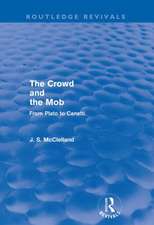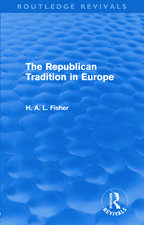Vichy France and Everyday Life: Confronting the Challenges of Wartime, 1939-1945
Editat de Dr Lindsey Dodd, Dr David Leesen Limba Engleză Paperback – 25 dec 2019
| Toate formatele și edițiile | Preț | Express |
|---|---|---|
| Paperback (1) | 231.34 lei 6-8 săpt. | |
| Bloomsbury Publishing – 25 dec 2019 | 231.34 lei 6-8 săpt. | |
| Hardback (1) | 307.86 lei 3-5 săpt. | +29.16 lei 7-13 zile |
| Bloomsbury Publishing – 27 iun 2018 | 307.86 lei 3-5 săpt. | +29.16 lei 7-13 zile |
Preț: 231.34 lei
Preț vechi: 265.35 lei
-13% Nou
Puncte Express: 347
Preț estimativ în valută:
44.29€ • 45.55$ • 36.74£
44.29€ • 45.55$ • 36.74£
Carte tipărită la comandă
Livrare economică 19 februarie-05 martie
Preluare comenzi: 021 569.72.76
Specificații
ISBN-13: 9781350143791
ISBN-10: 1350143790
Pagini: 264
Ilustrații: 2 bw illus
Dimensiuni: 156 x 234 x 14 mm
Greutate: 0.37 kg
Editura: Bloomsbury Publishing
Colecția Bloomsbury Academic
Locul publicării:London, United Kingdom
ISBN-10: 1350143790
Pagini: 264
Ilustrații: 2 bw illus
Dimensiuni: 156 x 234 x 14 mm
Greutate: 0.37 kg
Editura: Bloomsbury Publishing
Colecția Bloomsbury Academic
Locul publicării:London, United Kingdom
Caracteristici
Key topics and themes, like memory, gender, class, generations, ethnicity, human agency and the civilian experience, are addressed throughout
Notă biografică
Lindsey Dodd is Senior Lecturer in Modern European History at the University of Huddersfield, UK. She is the author of French Children under the Allied Bombs (2016).David Lees is Senior Teaching Fellow in French Studies at the University of Warwick, UK. He is one of the co-editors of The Routledge Handbook of French Politics and Culture (2018).
Cuprins
List of FiguresAcknowledgementsIntroduction, Lindsey Dodd (University of Huddersfield, UK) and David Lees (University of Warwick, UK)Part I - Coping and Helping in Wartime France1. Children and Play in Occupied France, Camille Mahé (Center for History, Sciences Po, France)2. Coping in the Classroom: Adapting Schools to Wartime, Matthieu Devigne (Sorbonne, France)3. Reconstructing the Daily Life of a Lyonnaise Family, Isabelle von Bueltzingsloewen (Lyon II, France)4. The Daily Lives of French Railway Workers, Sylvère Aït Amour (Rails et Histoire, France)5. Helping the Most Needy: The Role of the Secours National, Jean-Pierre Le Crom (Nantes, CNRS, France)6. The American Friends Service Committee and Wartime Aid to Families, Shannon L. Fogg (Missouri University of Science and Technology, USA)7. Urban Lives, Rural Lives and Children's Evacuation, Lindsey Dodd (University of Huddersfield, UK)Part II - Confrontation and Challenge in Wartime France8. Colonial Prisoners of War and French Civilians, Sarah Frank (International Studies Group, University of the Free State, South Africa) 9. Wehrmacht Brothels, Prostitution and Venereal Desire, Byron Schirbock (University of Cologne, Germany)10. Madeleine Blaess: An Emotional History of a Long Liberation, Wendy Michallat (University of Sheffield, UK) 11. Counter-Revolution? Resisting Vichy and the National Revolution, Mason Norton (Edge Hill University, UK) 12. Vichy Cinema and the Everyday, Steve Wharton (University of Bath, UK) 13. Defining Everyday Frenchness under Vichy, David Lees (University of Warwick, UK)Select Bibliography
Recenzii
[A] welcome addition to a growing literature about everyday life in wartime France and, as the editors point out, should be read alongside those works . [The] editors should be praised for their dedication to bringing together scholars who work in both English and French and for ensuring the French scholarship was translated into English. This feature makes the collection particularly valuable for people who teach in English, but want to include contemporary French scholarship.
The authors significantly expand our understanding of ordinary and not-so-ordinary French men and women during the Vichy era and illuminate the lived experiences of people typically elided in political or economic histories . Many of the chapters offer innovative methodological approaches, ask novel questions, or plumb new source bases.
This book opens fresh perspectives on Vichy France, reversing the standard focus on elites by approaching the regime 'from below'. It explores ordinary, everyday life under the Occupation with its challenges, privations and daily preoccupations, offering insights into lived experience stretching from the banal and humdrum to the extraordinary and heroic.
The authors significantly expand our understanding of ordinary and not-so-ordinary French men and women during the Vichy era and illuminate the lived experiences of people typically elided in political or economic histories . Many of the chapters offer innovative methodological approaches, ask novel questions, or plumb new source bases.
This book opens fresh perspectives on Vichy France, reversing the standard focus on elites by approaching the regime 'from below'. It explores ordinary, everyday life under the Occupation with its challenges, privations and daily preoccupations, offering insights into lived experience stretching from the banal and humdrum to the extraordinary and heroic.

















